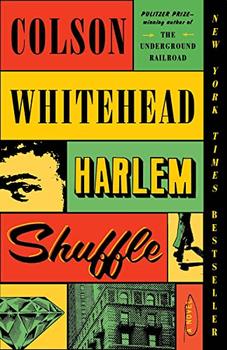Summary | Excerpt | Reading Guide | Reviews | Beyond the Book | Readalikes | Genres & Themes | Author Bio

Often Carney went down the street for a ham and cheese to let the man work in peace.
Aronowitz never failed to make the fix, find the part. The new technology vexed the old man, however, and he usually had Carney return the next day for TV sets, or the next week once the new picture tube or valve arrived. Refusing to shame himself by walking down the block to hit up a competitor. That's how Carney ended up there that morning. He'd dropped off the twenty-one-inch Philco last week. If he was lucky, the old man would take the radios off his hands.
Carney carried one of the big RCAs into the shop and went back for the next. "I'd have the boy help you," Aronowitz said, "but I had to cut back on his hours."
The boy Jacob, a surly, pockmarked teenager from a Ludlow Street rookery, hadn't worked there for more than a year as far as Carney could tell. The "& Sons" on the sign had ever been aspirational—Aronowitz's wife had moved back to Jersey to live with her sister long ago—but bluster and bravado were a motif for Radio Row establishments. Top of the City, House of Values, Cannot Be Beaten. Decades before, the electronics boom made the neighborhood into a theater for immigrant ambition. Hang a shingle, deliver your pitch, and climb out of the tenement stew. If things go well, you open a second location, expand into the failed shop next door. Pass the business on to your sons and retire to one of the new Long Island suburbs. If things go well.
Carney thought Aronowitz should drop the Sons thing and go for something more hip: Atomic TV & Radio, Jet Age Electronics. But that'd be a reversal of their relationship, as it was Aronowitz who delivered the advice at this address, one entrepreneur to another, generally of the "physician, heal thyself" variety. Carney didn't need the old man's tips on accounting practices and merchandise placement. His business degree from Queens College hung in his office next to a signed photograph of Lena Horne.
Carney got the three radios inside. Sidewalk traffic on the Row wasn't what it used to be.
"No, they're not broken," Carney said as Aronowitz unfurled his roll of instruments. The roll was green felt, with slots. "I thought you'd want them, maybe."
"Nothing wrong with them?" Like something that worked okay was an alien proposition.
"I figured I was coming down to pick up the TV, I'd see if you were interested." On the one hand, why would a radio man need a radio, but on the other, every businessman had a sideline. He knew this to be true of Aronowitz. "Strip them for parts or something?"
Aronowitz's shoulders dropped. "Parts. I sure don't have customers, Mr. Carney, but I have parts."
"You have me, Aronowitz."
"I have you, Mr. Carney. And you are very reliable." He asked after Carney's wife and daughter. A baby on the way? Mazel tov. He ran a thumb down his black suspenders and considered. Dust squirmed in the light. "I know a guy in Camden," Aronowitz said, "he specializes. Likes RCAs. Maybe he's interested. Or he isn't. You leave them, next time you come in, I'll tell you how it went." There was the matter of the Magnavox. Walnut cabinet, eighteen-inch woofer, Collaro changer. And top-of-the-line three years ago. "Leave that, too, we'll see."
The old man had always been droopy in the face, a jowl overall with saggy lobes and eyelids, and droopy in his wretched posture. As if when he bent over the machines all those hours they were sucking him into themselves. The downward pull had accelerated recently, his submission to the facts of his life. The merchandise had changed, the clientele transformed into new beings, and aspiration wasn't all it was cracked up to be. But he had a few diversions to keep him busy, these twilight days.
"I have your TV," he said. He coughed into a faded yellow handkerchief. Carney followed him into the back.
The name of the store—stark letters in gold paint on the shop window—promised one thing, the shabby front office another, and this room delivered a third thing that was entirely spiritual. The atmosphere was different, murky yet reverential, the Radio Row hubbub hushed. Disassembled receivers, picture tubes in various sizes, guts of machines lay on cluttered metal shelves. In the center of the room, the worktable was spotlit where a blank space in the scarred wood waited for the next patient, tools and boxy measuring instruments arranged neatly around it. Fifty years ago, most of the stuff in the room hadn't existed, was half a notion scurrying at the edge of an inventor's imagination—and suddenly there were rooms like this, where men maintained its secrets.
Excerpted from Harlem Shuffle by Colson Whitehead. Copyright © 2021 by Colson Whitehead. Excerpted by permission of Doubleday. All rights reserved. No part of this excerpt may be reproduced or reprinted without permission in writing from the publisher.
Your guide toexceptional books
BookBrowse seeks out and recommends the best in contemporary fiction and nonfiction—books that not only engage and entertain but also deepen our understanding of ourselves and the world around us.